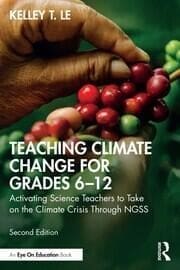In Brief:
Taylor & Francis Group – Given that today’s children will inherit the consequences of climate change, schools are instrumental in mobilizing a global response to the climate crisis, a science educator argues.

Climate literacy advocate Kelley T. Lê argues that climate change is the defining issue of our time, and in her new book, Teaching Climate Change for Grades 6–12: Activating Science Teachers to Take on the Climate Crisis Through NGSS, Lê provides teachers, administrators, and global leaders with practical tools to empower students as climate leaders in their communities.
With over 15 years of experience in science education, Lê draws on her work as a teacher, instructional coach, and educational leader. Her advocacy for climate literacy has earned national recognition, including the Friends of the Planet Award from the National Center for Science Education.
A Blueprint for Transformation
The climate crisis is no longer a future concern but is occurring in real-time. However, on average, schools dedicate only one to two hours per year to climate-specific education. Many young people are ill-equipped to understand or respond to this critical issue, according to Lê, who suggests schools are the perfect place to fix this issue by empowering students to become informed decision-makers and change agents.
In Teaching Climate Change for Grades 6–12, Lê, Executive Director of the Grades of Green Nonprofit and former inaugural Executive Director of the UC-CSU Environmental and Climate Change Literacy Projects, advocates for action. Using practical tools to teach climate science, this timely resource equips educators with the tools to teach climate change and foster students’ hope and resilience.
The book includes custom guides that help teachers address the complexity of climate change while tying the concept to urgent social and environmental justice issues. By linking lessons to climate events and culturally relevant teaching, Teaching Climate Change for Grades 6–12 transforms science education into a tool for empowerment.
“Education is the Hidden Superpower in the Fight Against Climate Change”
Lê believes education is the key to tackling the climate crisis: “Teachers have a unique opportunity to inspire and empower students to take meaningful action against climate change. This isn’t just about teaching science — it’s about equipping the next generation with the tools they need to build a sustainable and just future. Education has the power to catalyze change, and that work begins in our classrooms.”
The book comes at a critical time as climate literacy becomes an increasingly urgent global priority. Recent surveys show that while 90% of high school students believe climate change is happening, many lack the knowledge to explain its causes and consequences. Teachers are the bridge, bringing awareness and action and providing students with the skills to confront these challenges head-on.
Strategies to Empower Students in Addressing the Climate Crisis
- NGSS Alignment: This book inspires teachers to incorporate real-world climate phenomena into their lessons, aligning with Next Generation Science Standards (NGSS) while captivating students in enriching and impactful learning experiences.
- Equity and Justice Focus: It highlights the disproportionate impact of climate change on marginalized communities, encouraging teachers to address these issues through culturally responsive practices.
- Student Agency: By linking classroom lessons to actionable solutions, the book empowers students to become advocates for change in their communities.
Journal Reference:
Lê, K.T. , ‘Teaching Climate Change for Grades 6–12: Activating Science Teachers to Take on the Climate Crisis Through NGSS (2nd ed.)’, Routledge. DOI: 10.4324/9781003478584
Article Source:
Press Release/Material by Taylor & Francis Group
Featured image credit: jcomp | Freepik.com




